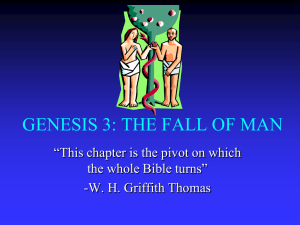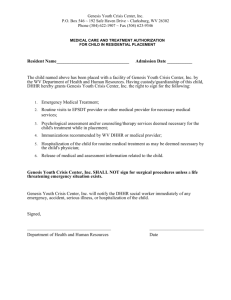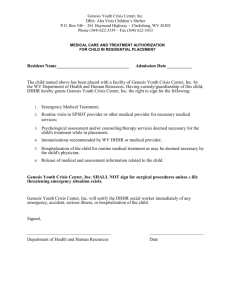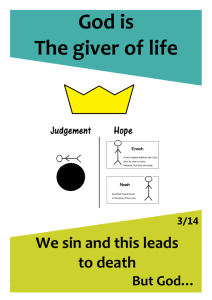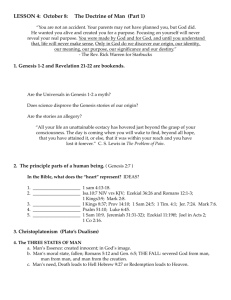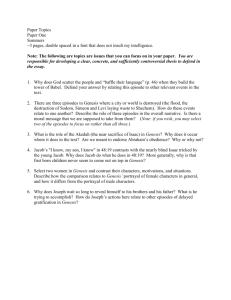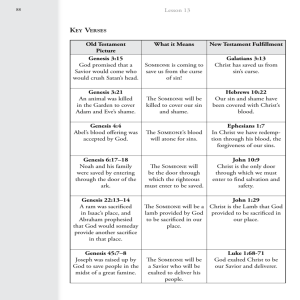Unit 5 - Study Questions - New Heights Christian Church
advertisement
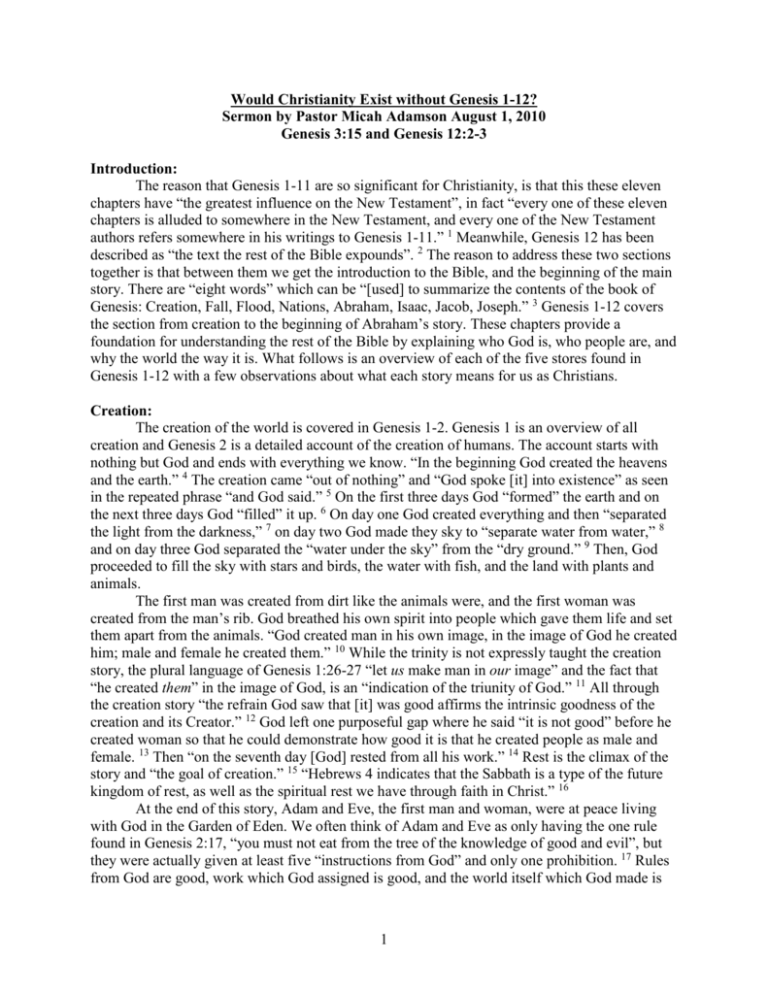
Would Christianity Exist without Genesis 1-12? Sermon by Pastor Micah Adamson August 1, 2010 Genesis 3:15 and Genesis 12:2-3 Introduction: The reason that Genesis 1-11 are so significant for Christianity, is that this these eleven chapters have “the greatest influence on the New Testament”, in fact “every one of these eleven chapters is alluded to somewhere in the New Testament, and every one of the New Testament authors refers somewhere in his writings to Genesis 1-11.” 1 Meanwhile, Genesis 12 has been described as “the text the rest of the Bible expounds”. 2 The reason to address these two sections together is that between them we get the introduction to the Bible, and the beginning of the main story. There are “eight words” which can be “[used] to summarize the contents of the book of Genesis: Creation, Fall, Flood, Nations, Abraham, Isaac, Jacob, Joseph.” 3 Genesis 1-12 covers the section from creation to the beginning of Abraham’s story. These chapters provide a foundation for understanding the rest of the Bible by explaining who God is, who people are, and why the world the way it is. What follows is an overview of each of the five stores found in Genesis 1-12 with a few observations about what each story means for us as Christians. Creation: The creation of the world is covered in Genesis 1-2. Genesis 1 is an overview of all creation and Genesis 2 is a detailed account of the creation of humans. The account starts with nothing but God and ends with everything we know. “In the beginning God created the heavens and the earth.” 4 The creation came “out of nothing” and “God spoke [it] into existence” as seen in the repeated phrase “and God said.” 5 On the first three days God “formed” the earth and on the next three days God “filled” it up. 6 On day one God created everything and then “separated the light from the darkness,” 7 on day two God made they sky to “separate water from water,” 8 and on day three God separated the “water under the sky” from the “dry ground.” 9 Then, God proceeded to fill the sky with stars and birds, the water with fish, and the land with plants and animals. The first man was created from dirt like the animals were, and the first woman was created from the man’s rib. God breathed his own spirit into people which gave them life and set them apart from the animals. “God created man in his own image, in the image of God he created him; male and female he created them.” 10 While the trinity is not expressly taught the creation story, the plural language of Genesis 1:26-27 “let us make man in our image” and the fact that “he created them” in the image of God, is an “indication of the triunity of God.” 11 All through the creation story “the refrain God saw that [it] was good affirms the intrinsic goodness of the creation and its Creator.” 12 God left one purposeful gap where he said “it is not good” before he created woman so that he could demonstrate how good it is that he created people as male and female. 13 Then “on the seventh day [God] rested from all his work.” 14 Rest is the climax of the story and “the goal of creation.” 15 “Hebrews 4 indicates that the Sabbath is a type of the future kingdom of rest, as well as the spiritual rest we have through faith in Christ.” 16 At the end of this story, Adam and Eve, the first man and woman, were at peace living with God in the Garden of Eden. We often think of Adam and Eve as only having the one rule found in Genesis 2:17, “you must not eat from the tree of the knowledge of good and evil”, but they were actually given at least five “instructions from God” and only one prohibition. 17 Rules from God are good, work which God assigned is good, and the world itself which God made is 1 good. “God is the king of creation” and humans are part of creation, but also made in God’s image with responsibilities to represent God on earth. 18 Human beings created in “the image of God experience [relationships]” as God does, with God as ruler, with other people as equals, and with the creation under our dominion. 19 However, this “dominion is to be exercised with care and responsibility. Nothing destructive or exploitive is permissible.” 20 Life in the Garden of Eden is a picture of what the world is supposed to be like, with “God’s people in God’s place under God’s rule and blessing.” 21 Fall: The account of the fall and its effects in Genesis 3-5 helps to answer the question “if the world was created very good, why is there so much pain and suffering, anger and hatred in it?” 22 This story does not answer all of our questions about the origin of evil, the New Testament has to identify the snake as the devil in Revelation 2:20, and we are never given a complete story of the origin of the devil’s sin anywhere in the Bible although it is alluded to in several places. What we do know is that Adam and Eve disobeyed God by doing the only thing that they were prohibited from doing, eating from the tree of the knowledge of good and evil. Rather than ruling over the animals, a snake led Adam and Eve into sin. Adam is credited with bringing sin into the world since when Eve ate, she “was deceived”, but when Adam ate, he committed “a direct transgression without deception.” 23 Until this time Adam and Eve were sinless and there was “no inward principle of evil to work on, the [temptation] to sin had to come from [outside].” 24 As a result of Adam’s sin “the Lord God banished him from the Garden of Eden to work the ground from which he had been taken.” 25 God had warned that “when you eat of it you will surely die” 26 and now his judgment was “dust you are and to dust you will return.” 27 Adam “will rule over” Eve now and “the ground [is cursed] because of you.” 28 Adam and Eve’s relationships with God, each other, and the world were ruined, and the earth itself was cursed. People’s sin is the cause of the suffering death we are so familiar with today. God did not change, he “continues to reign, but he reigns in judgment.” 29 The problem is not that God isn’t king any more; the problem is that God’s people are now “no-one” and all people are “banished” from God’s place, living in “disobedience” and under the “curse.” 30 However, we see God’s grace after sin and judgment. In Genesis 3:15, God speaks of “a time in the future when a son of Eve, a human being, will destroy the evil one.” 31 In Genesis 3:20, we also find that “the first physical deaths should have been the man and his wife, but it was an animal—a shadow of the reality that God would someday kill a substitute to redeem sinners.” 32 Adam gave Eve the name “lifegiver” which is evidence that they trusted God to save them as he promised. 33 Eve had a son name Cain and probably “[thought] that Cain was that promised seed.” 34 Adam’s children are described as being “in his own likeness” and “in his own image” which is an indication that people are still made in God’s image even after the fall. 35 However, hopes were dashed when Cain killed Abel after failing to worship God correctly with the type of sacrifice that God required, proving that sin was also passed on to next generations. In fact things were getting worse, “Cain was so angry he would not be talked out of his sin— even by God. Eve, however, had to be talked into her sin by Satan.” 36 “Adam” had “accepted God’s judgment in silence, but Cain protested fiercely.” 37 The record of Cain’s family that follows shows that “worldly knowledge, wisdom and mechanical inventions rapidly developed.” 38 and that these “achievements are credited to Cain’s descendants.” 39 In fact, when “evaluated from a human point of view, Cain’s descendants are an admirable lot.” 40 who lived the “prosperous good life” 41 and “talented society [was] founded by Cain.” 42 This is a caution 2 against thinking that worldly good is ultimately good, but also a caution against thinking of unbelievers as incapable of anything good. The genealogy of the Seth’s family highlights the fact that death is still inherited from Adam and Eve. Over and over “in spite of the long lives, the phrase is repeated, ‘and he died.’” 43 However, there is an exception; in one case the phrase “and he died” is replaced by “Enoch walked with God.” 44 From Enoch’s example “we are given hope, that even in a fallen world, it is possible to know God and escape the penalty of death.” 45 Flood: The record of the flood in Genesis 6-9 shows God’s continued love for creation and his demand for justice. Sin increased so much in both Seth and Cain’s family “that every inclination of the thoughts of [mankind’s] heart was only evil all the time.” 46 God decided to destroy the world with a flood and start over with Noah by having him build an ark and save his family and the animals. Noah is described as “a righteous man, blameless among the people of his time, and he walked with God.” 47 Noah “enjoyed [the same] intimacy of relationship in walking with God” as Enoch had. 48 However, Noah was not sinless as we will see at the end of this story. “The building of the ark was not a works salvation. Noah built the ark as an expression of his faith, but it was faith that saved him.” 49 There is no denying that Noah “was obedient, as well.” 50 This is another illustration of the point that when God’s people trust and obeying God’s commands it leads to God’s blessing. God reversed creation in the flood by undoing the separation of the land, the sea, and the water in the sky, “all the springs of the great deep burst forth, and the floodgates of the heavens were opened.” 51 After the flood was over, God brought Noah and the ark safely down on the top of Mt. Ararat. God’s grace is seen in the fact that he still accepted sacrifices after the flood and promised never to flood the earth again. The goodness of creation is reaffirmed by the fact that God was willing to start again. The commands that God gave to people and animals after the flood to “Be fruitful and increase in number and fill the earth” mirror the commands God gave at the beginning of creation. 52 However, God’s new rule to punish the sin of murder by execution shows that sin and death are not removed. The fact that people are still made in the image of God is confirmed by this same command, “whoever sheds the blood of man, by man shall his blood be shed; for in the image of God has God made man.” 53 The last event of Noah’s life is another sad reminder that sin and the curse is still being passed on to new generations. Noah drank wine until he passed out drunk, took off all his cloths, and his son Ham made sport of him. When Noah woke up he cursed his son for generations and the people who descended from Ham’s son Canaan lived up to the sin and the curse. Noah was far from innocent in all this, but set a bad example for ages to come since, “intoxication and sexual looseness are hallmarks of [Canaan’s descendants], and both are traced back to this event in Noah’s life.” 54 Nations: The history of nations recorded in Genesis 10-11 reveals that God will continue to work in history in spite of sin. Genesis 10 is a genealogy of Noah’s sons divided by nations and languages showing that all people are related and therefore all people bear God’s image. In Genesis 10:25, we read about a man “named Peleg, because in his time the earth was divided”. Genesis 11 is the story of how the people came to be divided by languages and nations “five generations after the Flood.” 55 God told people to spread out and fill the earth, but people 3 refused and tried to stay in one place saying “Come, let us build ourselves a city, with a tower that reaches to the heavens, so that we may make a name for ourselves and not be scattered over the face of the whole earth.” 56 The fact that they tried to build a tower to reach to heaven shows that they believed that they could reach God on their own. Instead in Genesis 11:5 we find that “far from reaching heaven, Babel’s tower could hardly be seen from there — the Lord had to ‘come down to see it.’” 57 This is a lesson for us is not to put our faith in human endeavors. God “confuse[d] their language so they” were not able to “understand each other” forcing the people to abandon their building project and split up. 58 The punishment fit the crime, “God’s punishment is directed at both the instrument of sin that made the building project possible, one language, and at the intent of that sin, to avoid being scattered over the earth.” 59 This was an “attempt to unify themselves for their own glory” but instead “God scatter[ed] them by confusing their language.” 60 In the fall, and the flood, God immediately showed his grace after people’s sin and his judgment. However, after the Tower of Babel “we have to wait until the next chapter, and another generation” to see God’s grace. 61 Abraham: Genesis 1-11 is the introduction to the Bible and Genesis 12 is where the story really starts. God appeared to Abraham and made a promise to give him a land, a son, and a blessing. “God’s people” would again be “in God’s place under God’s rule and blessing.” 62 Abraham was not chosen because of his goodness, according to Joshua 24:2 Abraham’s father “was an idolater, worshiping other gods.” 63 Originally, the land was Canaan and the son was Isaac, but the promised blessing always included, “all peoples on earth will be blessed through you.” 64 God’s promise to Abraham in Genesis 12 is ultimately fulfilled “through Jesus Christ, a descendant of [Abraham].” 65 Jesus “and those from all nations who trust in him, are God’s people; and we can look forward to enjoying the fullness of God’s blessing, not on earth, but in heaven.” 66 Abraham moved to Canaan in obedience to God, but at the first sign of trouble he “went down to Egypt to live there for a while because the famine was severe.” 67 Rather than being a blessing to other nations, Abraham lied and said that Sarah was his sister, which led to Pharaoh taking her as his wife, which in turn led to God sending plagues on Pharaoh and Abraham being sent back to Canaan. This story “is significantly placed right after [Abraham’s] call and obedience” since “[Abraham] was not walking by faith as he had been in the beginning”, which shows that “God had made promises to him and would keep them.” 68 This story helps show that God’s “promises are absolute and not conditional” and from now on “this emphasis shifts the promises away from the idea of a reward to the idea of a gift.” 69 Abraham shows that we can only be saved by God’s goodness and not our own. Conclusion: Genesis 1-12 is the groundwork upon which the foundation of Christianity is laid. It explains where the world came from, where sin came from, what is God like, why people are the way they are, and how God relates to people. It foretells the coming of the serpent crusher and gives us the promise of the world being blessed through the seed of Abraham. There are many answers in the world to the questions of the origin of our species, the nature of human beings, the purpose and meaning of life, and how to solve the world’s problems, but they are not Christian answers. The Christian answers in the rest of the Bible are all built on the answers provided here in Genesis 1-12. A form of religion could exist without Genesis 1-12, but it would be a very different religion than Christianity. 4 Do you acknowledge that God’s rule is good and that he is the rightful king of the universe and your life? Do you admit that you are a participant in Adam’s sin; that you’ve inherited it and continued it? Do you agree that God has the right to judge the world and all people because of sin? Do you recognize that even given a fresh start, you would not be able avoid sin on your own? Do you trust that the only way you can be right with God is if God takes it upon himself to restore a relationship with you by providing the sacrifice, and ultimately being the sacrifice himself, for your sin through Jesus death on the cross? If you believe that God alone can restore you to being one of his people, living with him under his rule and blessing, then based on God’s promise, you are welcomed into communion with God and into fellowship with other believers in Jesus as a Christian. 5 Works Cited: Carson, D. A. New Bible Commentary: 21st Century Edition. 4th Edition. Electronic Edition. Downers Grove: InterVarsity Press, 1994. DeRidder, Michael. Pentateuch. Three Hills: Prairie Bible Institute, 2003. Hamilton, Victor, Handbook on the Pentateuch. Grand Rapids: Baker, 2005. Holy Bible: New International Version. Electronic Edition. Grand Rapids: Zondervan, 1984. All scripture quotations are taken from the New International Version of the Holy Bible. Libronix Digital Library System. Version 3.0f. Bellingham: Logos Research Systems, 2007 All electronic edition sources are from Logos Libronix DLS. MacArthur, John Jr. The MacArthur Study Bible. Electronic Edition. Nashville: Word Publications, 1997. Roberts, Vaughan. God’s Big Picture. Dowers Grove: InterVarsity Press, 2002. Walvoord, John F., Roy B. Zuck and Dallas Theological Seminary. Electronic Edition. The Bible Knowledge Commentary: An Exposition of the Scriptures. Wheaton: Victor Books, 1983. Wiersbe, Warren W. Wiersbe's Expository Outlines on the Old Testament. Electronic Edition. Wheaton: Victor Books, 1993. Willmington, H. L. The Outline Bible. Wheaton: Tyndale House Publishers, 1999. End Notes: 1 DeRidder p. 11 Roberts p. 52 3 DeRidder p. 9 4 Genesis 1:1 5 MacArthur on Gen. 1:3 6 Wiersbe on Gen.1:1-31 7 Genesis 1:4 8 Genesis 1:6 9 Genesis 1:9 10 Genesis 1:27 11 MacArthur on Gen. 1:26 12 Carson on Gen. 1:3-5 13 Genesis 2:18 14 Genesis 2:2 15 Roberts p. 31 16 Wiersbe on Gen. 2:1-3 17 Willmington on Gen. 1:1-2:19 18 Roberts p. 28 19 DeRidder p. 40 20 Hamilton p. 28 21 Roberts p. 21 22 Carson on Gen. 2:4-3:24 23 MacArthur on Gen. 3:6 24 MacArthur on Gen. 2:25 25 Genesis 3:23 26 Genesis 2:17 27 Genesis 3:19 28 Genesis 3:16-17 29 Roberts p. 43 30 Roberts p. 43 31 Roberts p. 49 2 6 32 MacArthur on Gen. 3:21 Wiersbe on Gen. 3:20-24 34 Hamilton p. 46 35 Genesis 5:3 36 Walvoord on Gen. 4:6-7 37 Carson on Gen. 4:1-16 38 DeRidder p. 53 39 Carson on Gen. 4:17-26 40 Wiersbe on Gen 4:17-26 41 Walvoord on Gen. 4:19-24 42 Willmington on Gen. 3:1-5:23 43 DeRidder p. 53 44 Genesis 5:22 45 Roberts p. 50 46 Genesis 6:5 47 Genesis 6:9 48 MacArthur on Gen. 5:24 49 DeRidder p. 64 50 MacArthur on Gen. 6:8 51 Genesis 7:11 52 Genesis 1:22, 28, and 9:1 53 Genesis 9:6 54 Walvoord on Gen. 9:18-23 55 Walvoord on Gen. 10:21-31 56 Genesis 11:4 57 Carson on Gen.11:1-9 58 Genesis 11:7 59 Hamilton p. 76 60 Willmington on Gen. 11:1-32 61 Roberts p. 52 62 Roberts p. 21 63 Walvoord on Gen. 10:27-32 64 Genesis 12:3 65 Willmington on Gen. 12:1-25:18 66 Roberts p. 54 67 Genesis 12:10 68 Walvoord on Gen. 12:10-20 69 Hamilton p. 85 33 7
